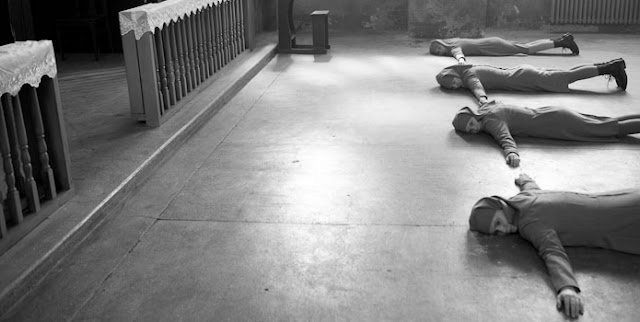CELLULOID MAN
Documentary
by Shivendra Singh Dungarpur
2012
/ India/ 164 min
5.45pm
/ 2nd Aug 2015/ Perks Mini Theater
Celluloid
Man screening is part of Thamizh Studio’s 2015 Lenin award function. Sri. P.K Nair will
be receiving the 2015 Lenin Award at Chennai on Aug 15th 2015.
Celluloid Man is a tribute to film archivist and cinephile extraordinaire P.K. Nair, a man whose childhood fascination
with cinema finally led to the creation of the National Film Archive of India.
In a country where film preservation was once regarded as irrelevant, Nair's
has been a long, hard fight to preserve precious fragments of India's film
heritage that would otherwise be lost forever.
Comparable to France's late, great 'man of cinema', the
noted film archivist Henri Langlois, Nair has also influenced generations of
Indian filmmakers by introducing them to new worlds through the prism of
cinema. Featuring wonderful clips and interviews with many Indian and
international filmmakers, this award-winning documentary is both a portrait of
a man's passion with film and a love letter to cinema itself.
The film is a deeply personal and nostalgic take on the
life of P. K. Nair, the man almost wholly responsible for what is now known as
the National Film Archives of India (NFAI), in Pune. And through the journey of
the film, we also understand what true passion for cinema is; how someone can
be so devoted to collecting and archiving films for posterity, because he
understands what very few people do – that perhaps films offer the most
comprehensive and indicative representation of the times, even if most of the
films he collected and archived were ‘fiction’.
Shot by some of the foremost cinematographers in India -
names like Santosh Thundiyil, K. U. Mohanan, Mahesh Aney, Vikas Sivaraman,
Kiran Deohans and the likes – the film also looks at Mr. Nair’s life through
the eyes of the some of the most respected names in Indian cinema; a number of
them being former students of Mr. Nair from the Film & Television Institute
of India. Through rich anecdotes and little stories that highlight the man’s
tireless work and the result of it – prints of tens of thousands of film from
across the world stored, the work of great masters worth many times their
weight in gold - the film is a heartfelt ride that is inspiring and humbling at
the same time.Celluloid Man will move you, and will reinforce the fact
that cinema is life.
(Source: Internet)
Shivendra
Singh Dungarpur
Shivendra Singh Dungarpur (born 25 August 1969) is an
award-winning filmmaker, producer, film archivist and restorer. Following a
successful career as a maker of ad-films and documentaries, he has established
the Film Heritage Foundation in 2014.Shivendra Singh Dungarpur belongs to the royal
family of Dungarpur State in Rajasthan. After graduating from St. Stephen's
Delhi, he joined Film and Television Institute of India (FTII) at Pune. After
that he started Dungarpur Films in 2001.
Shivendra Singh is a patron of the British Film Institute
and was a donor for the restoration of Alfred Hitchcock's silent film, The
Lodger: A Story of the London FogHe facilitated the restoration of the Indian
film, Uday Shankar's Kalpana (1948), by Martin Scorsese's World Cinema
Foundation, that was premiered in the Cannes Film Festival Classic section in
2012. In 2013, Shivendra collaborated with the World Cinema Foundation again
for the restoration of the 1972 Sinhalese film "Nidhanaya"
Shivendra's first feature length film was the 2012
documentary Celluloid Man, a film about P. K. Nair, India's pioneering film
archivist who was the founder-director of the National Film Archive of India.
Shivendra began filming the documentary in 2010 and it was completed in May
2012. The film premiered at the Il Cinema Ritrovato Festival in Bologna, Italy
on June 26, 2012.















